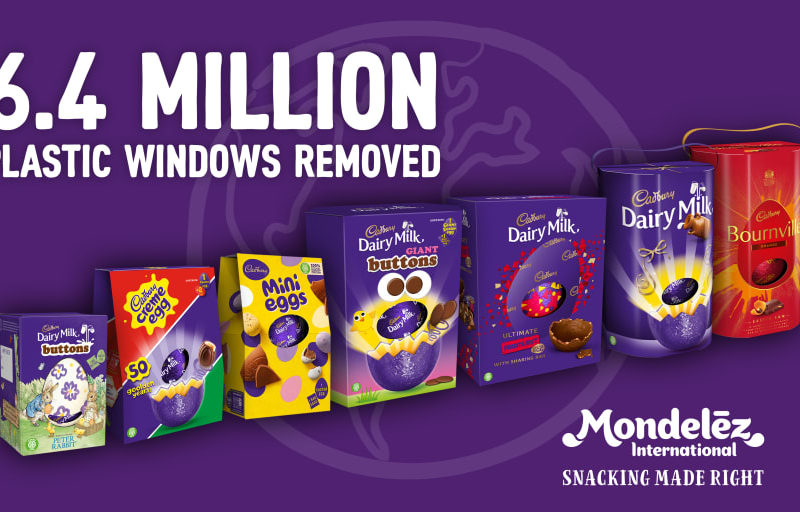
The company explained that move was designed to make its series easier for consumers to recycle, and follows in the wake of its wider environmental commitments, including a recently launched impact investment platform for eco-aware businesses.
The change means that the full Easter egg range, spanning Cadbury, Cadbury Dairy Milk, Cadbury Bournville, Fry’s, Green & Black’s, Maynard’s Bassets and OREO is plastic window free.
In addition, the company also reviewed the cardboard cartons for its shell egg range and were able to remove a further 108 tonnes of cardboard using 100% sustainably sourced cardboard. Mondelēz International has also continued its season specific on-pack recycling labelling, ‘Be A Good Egg’, in partnership with OPRL – the UK’s most recognised recycling label, across its entire Easter egg range to help people dispose of packaging correctly.
This move is part of the company’s ‘Pack Light and Pack Right’ strategy and its ongoing efforts to remove, reduce, replace and recycle packaging across its portfolio in support of its long-term vision of zero net waste packaging. Last year in the UK, Mondelēz removed 1.1 million plastic trays from its Christmas adult selection boxes, delivered a 15% reduction in the plastic used in its iconic Cadbury large share bags and also reduced its shelf ready packaging for the nation’s favourite chocolate bar, Cadbury Dairy Milk 360g sharing tablet, saving over 40 tonnes of cardboard on this product alone.
Louise Stigant, UK Managing Director, Mondelēz International, said: “Increasing the recyclability of our products and reducing the amount of packaging we use overall are important steps in contributing to the creation of a circular economy. In the last six months alone, we have removed over 192 tonnes of packaging in the UK and Ireland and removing the plastic windows from all our Easter eggs further supports our existing position as one of the most efficient users of plastic packaging in the consumer goods space.”
Mondelēz International has committed to global goals of making 100% of its packaging recyclable and labelled with clear consumer recycling information by 2025. To date 93.3% of its total packaging is already designed to be recyclable. Recently the company announced a new commitment to reduce its use of virgin plastics in its packaging and is aiming for at least a 25% reduction in virgin plastic use in its rigid plastic packaging, or a 5% reduction in virgin plastic use in its overall plastic packaging portfolio.
The company is a member of the UK Plastics Pact and a signatory of the Ellen MacArthur Foundation’s New Plastics Economy Global Commitment and has recently announced that Philadelphia cream cheese sold in the UK and Europe will be made using recycled plastic packaging from 2022.






